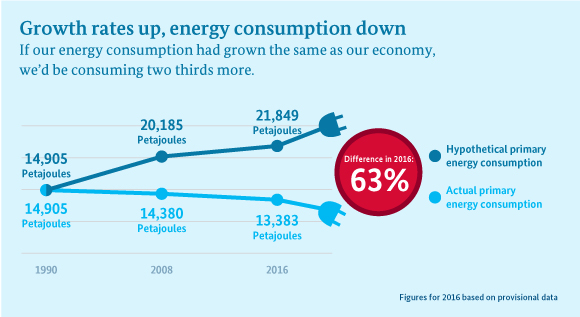Energy consumption lowered thanks to greater efficiency
The new brochure Energieeffizienz in Zahlen shows that our energy consumption would be 63% higher had it grown at the same speed as our economy. Thankfully, however, we have broken this link and started to use energy more efficiently.
 © Federal Ministry for Economic Affairs and Energy; data from Working Group on Energy Balances, Federal Statistical Office, Federal Environment Agency
© Federal Ministry for Economic Affairs and Energy; data from Working Group on Energy Balances, Federal Statistical Office, Federal Environment Agency
A new brochure entitled Energieeffizienz in Zahlen (in German only) provides a good overview of Germany's energy consumption and levels of energy efficiency. The figures have been broken down by sector and application. One thing we can learn from this data is that Germany has succeeded in breaking the link between its primary energy consumption and GDP growth. In fact, the country has even been able to lower its energy consumption, despite enjoying strong economic growth. If we hadn't succeeded in improving our energy efficiency since 1990, our primary energy consumption today would be approx. 63 per cent higher than it actually is. This means it would have been 22,000 petajoules (PJ) rather than the actual 13,400 PJ we used in 2016.
Primary energy consumption down more than 10 per cent
The baseline for this comparison is 1990, a year in which Germany's primary energy consumption stood at just under 15,000 PJ. Had our energy intensity rate, i.e. the ratio between our energy consumption and our GDP development, remained the same as it was then, our primary energy consumption would have grown along with our economy. In actual fact, however, our primary energy consumption has fallen by more than 10 per cent. Since 2008, our energy consumption has decreased by almost 1,000 PJ – which is nearly as much as Portugal's entire energy consumption.
This success is down to more efficient manufacturing methods and household devices, better insulation in buildings and all of the many other efforts that have allowed us to boost our energy efficiency and reduce our primary energy consumption. This can also been seen in the chart, which illustrates the development we've seen since 2008.
German government supporting households, firms, and municipalities
Notwithstanding this positive development, our energy consumption in Germany is still too high. Our aim is to lower it by 50 per cent compared to the figures of 2008. This means that there is a lot that remains to be done. The energy transition will only succeed if all of us work together to improve energy performance and reduce our energy consumption. The Federal Government operates a raft of advice and funding programmes to help individuals and companies reduce their energy consumption.

